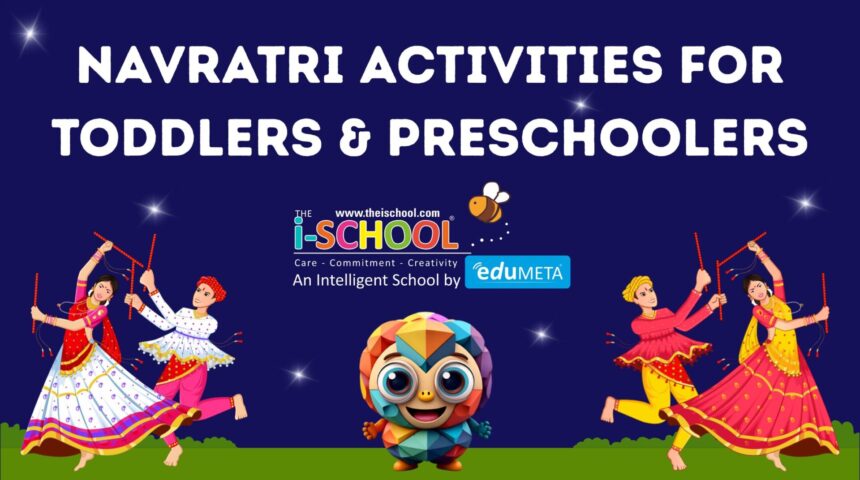Navratri Activities for Toddlers and Preschoolers: 9 Days of Learning Through Culture

Navratri is one of the most vibrant and meaningful festivals in India nine days of devotion, colors, music, and joy. For adults, it’s a spiritual celebration, but for toddlers and preschoolers, Navratri can become a magical opportunity to learn values, traditions, and creativity through play.
At eduMETA THE i-SCHOOL, we believe that festivals are living classrooms. They bring together culture, community, and learning in a way no textbook ever can. That’s why our Navratri celebrations are designed to be fun, age-appropriate, and full of lessons that stay with children for life.
Here’s how we turn –
9 days of Navratri into 9 days of playful learning
Day 1: Colors of Tradition
Each day of Navratri has a unique color. Toddlers dress in that color, explore related art activities (like finger painting or collages), and learn simple words like “red,” “yellow,” or “blue.” It builds cultural connection while strengthening color recognition.
Day 2: Storytime with the Goddess
Children love stories, especially when told with puppets or visuals. We narrate simplified tales of Goddess Durga, focusing on values like courage, kindness, and the triumph of good over evil. Storytelling becomes a way to connect culture with character building.
Day 3: Little Steps of Dance
Navratri is incomplete without Garba and Dandiya! For toddlers, we keep it playful clapping games, rhythmic steps, or dancing in a circle with soft sticks. It improves motor skills, coordination, and group bonding while keeping the festive spirit alive.
Day 4: Creative Hands at Work
Craft activities like decorating paper dandiya sticks, making goddess crowns, or creating colorful garlands keep preschoolers engaged. These activities boost creativity and fine motor skills while giving them festive keepsakes to proudly take home.
Day 5: Festive Music & Rhymes
Simple songs and rhymes about Navratri (or even traditional tunes adapted for children) are introduced. Music not only brings joy but also improves language, rhythm, and memory skills.
Day 6: Prasad & Sharing
Food is a big part of festivals. We introduce kids to prasad like fruits or small sweets and explain the importance of offering and sharing. This activity instills gratitude and empathy in a simple, child-friendly way.
Day 7: Dress-Up & Role Play
Children love to dress up! On this day, kids wear traditional clothes or role-play as characters from stories. It builds imagination, confidence, and an early appreciation for cultural attire.
Day 8: Acts of Kindness
Navratri is also about devotion and service. Preschoolers can practice kindness through simple activities helping a friend, sharing toys, or thanking teachers. These small actions bring the values of Navratri into everyday life.
Day 9: Celebration & Togetherness
The festival ends with a joyful gathering dancing, singing, sharing food, and displaying the crafts children made during the week. This final day reinforces the values of unity, happiness, and cultural pride.
Why Navratri Activities Are Perfect for Preschoolers
Cultural Awareness: Kids connect with traditions from an early age.
Life Values: Bravery, kindness, patience, and gratitude are learned through stories and activities.
Social Growth: Group celebrations encourage teamwork and confidence.
Joyful Memories: Festivals create emotional bonds and happy childhood moments.
Final Word
Navratri isn’t just a festival it’s a nine-day journey of learning, values, and joy. By blending culture with play, children not only enjoy themselves but also develop respect for traditions, confidence in social settings, and a deeper love for learning.
At eduMETA THE i-SCHOOL, every Navratri is a celebration of fun, culture, and character-building. Because when children celebrate with laughter and learning, they carry the festival’s spirit with them forever.
Nine days, nine colors, nine lessons for little hearts that shine bright!🌸
